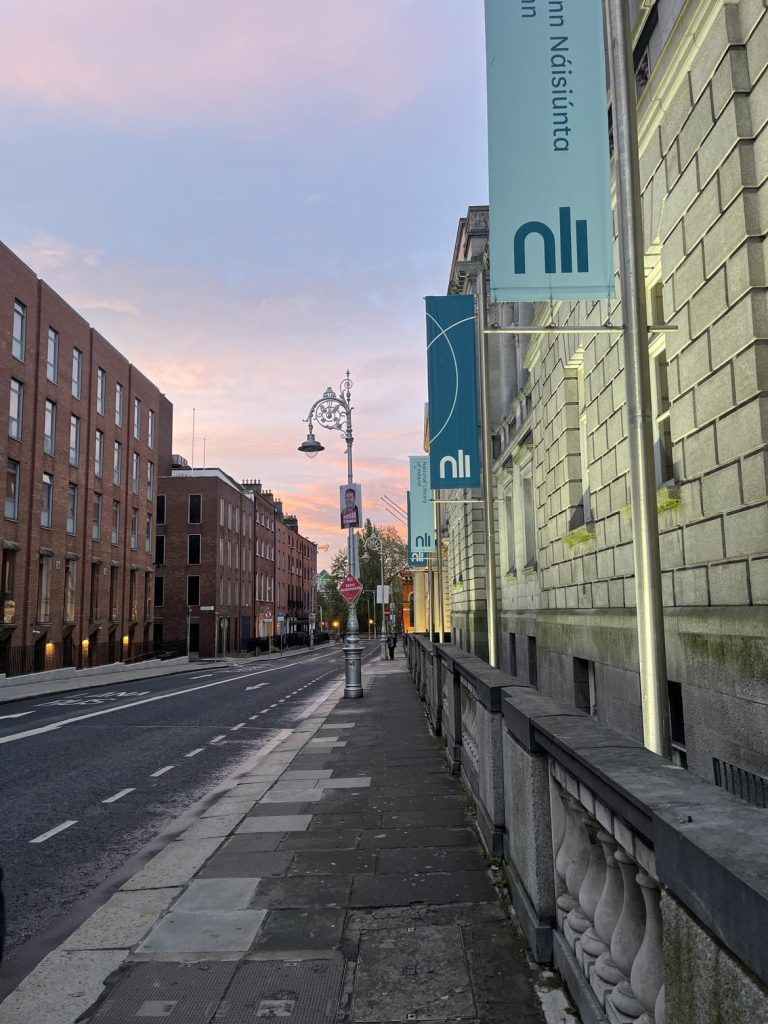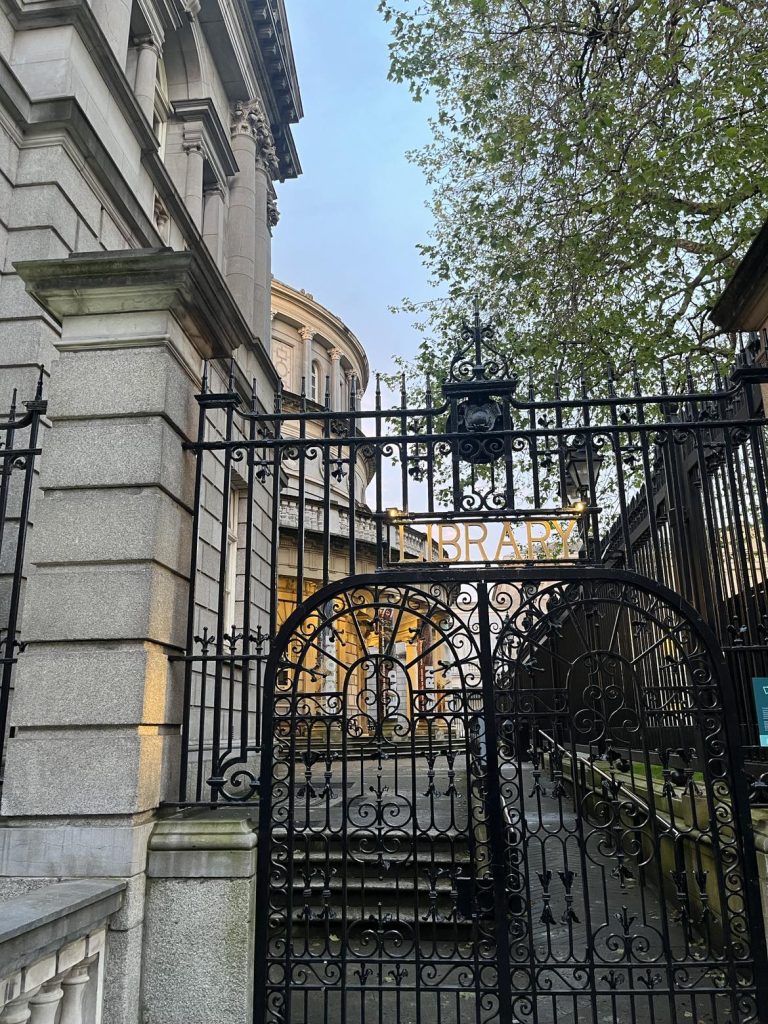In May 2024, I had the privilege of travelling to the National Library of Ireland (NLI) in Dublin to conduct research within their extensive archives, examining the work of Irish women nationalist writers, their unique networks and the subtle intertextual connections within their works which serve to establish a proto-feminist literary tradition within its own right. I am immensely grateful to BARS for the Stephen Copley Reseach Award which enabled me to undertake this trip and gain access to manuscripts which will prove imperative to my research. My dissertation project is largely dependent on original archival research, therefore this opportunity to make use of the NLI’s unique manuscripts has given me a strong foundation upon which to continue developing my project throughout the summer.
The drive towards defining a postcolonial Irish national consciousness that was Roman Catholic, politically nationalist, and concerned with ‘the land’ (Corkery, 1924) fostered an exceptionalism which subsequently defined Ireland’s romantic period, largely in opposition to English romanticism, as a late-flowering event propagated by an emergent organic intelligentsia. This has often led to a consideration of an Irish Romanticism that extends in scope from the work of a ‘traditional’ intelligentsia in the late eighteenth century to the emergence in the late nineteenth century of an ‘organic intelligentsia… at the service of the people’ (Eagleton, 1999). My MLitt project re-examines pioneering Irish writer and cultural hub Lady Augusta Gregory (1852-1932) within the context of this ‘long’ Irish Romantic period, alongside the women writers and activists who made up a network of radicalism, intertextuality, and subtlety which challenged the androcentric society in which they lived.

Gregory’s immense significance within the revivalist movement, the development of late Romantic nationalist literature, and the creation of an enduring Irish mythological canon has, until recently, been overshadowed in Irish literary criticism by the study of the men of her circle, such as W.B. Yeats. I am developing a series of research projects around Gregory’s life and works, analysing her cultural, literary, and political significance to Irish literature. Whilst the well-established field of Irish Literary Revival criticism (Dean, Kiberd) has successfully challenged English influence and developed the idea of an independent Irish canon, much of late twentieth-century criticism in this area takes an androcentric approach to Romantic revivalist projects such as that of Yeats. My project adds to the shift in more recent criticism towards the study of women writers independent of their relationships to their male counterparts (Tiernan, McAuliffe, Morris). I contend that Gregory’s significance in a feminist deconstruction of the canon is integral to the continual development of critical understanding of the Romantic Literary Revival and cultural nationalism. My approach to this project is interdisciplinary, incorporating elements of both New Historicism (Gallagher and Greenblatt, 2000) and Network Theory (LaTour 2005) as a means of understanding the role of women in a literary networks context. So far, this has included research into key female revolutionary networks, radical nationalist newspapers, such as Inghinidhe Na h- Éireann’s Bean na h-Éireann, and the papers of neglected female revolutionaries such as Sydney Gifford and Alice Milligan.
During my time at the NLI, I split my days between the Manuscript and Microfilm reading rooms, able to avail myself of truly invaluable information unavailable at any other location. I spent a particularly exciting day reading through over twenty issues of Bean na h-Éireann, one of the first ‘feminist’ nationalist periodicals published within Ireland. This paper provided a fascinating example of the role of nationalist newspapers as central hubs for the collective voice of revolutionary women, and as significant facilitators of the communication which enabled the development and expansion of a radical community of women activists. Within my research in the NLI, I aimed to explore some specific examples of how this phenomenon functioned as a method of network formation and political transformation. The life and work of nationalist journalist Sidney Gifford (1889-1974) acts as an illuminating case study of the power of the radical press and it was her papers that I set out to explore. Though a somewhat hidden figure within overall critical understanding of revolutionary Irish women, Gifford’s extensive papers include drafts of broadcasts, articles, and writings on the growth of nationalism in nineteenth-century Ireland which offer unique and illuminating insights into the period. The writings I uncovered within Gifford’s papers add to my understanding of the reasonings and motivations behind the political conversion of middle to upper-class protestant women to political and cultural nationalism during this period. Gifford speaks of the power of the radical press in bringing her into the nationalist movement, further enforcing the idea that the systems of influence connecting, developing and expanding women’s radical networks were specifically gendered and intrinsically linked with the literary sphere. I also had the opportunity to see the papers of Nannie Dryhurst (1856-1930), an Irish journalist, translator and activist. These included several correspondences with fellow female revolutionaries and early diary entries which reveal her as a central figure and hub within nationalist women’s networks. The material I accessed has enabled me to position Dryhurst as a figure akin to Gregory in her connective role within developing networks, acting as an influential reference point for many nationalist women concerned both with the fate of their country, and their gendered experience within this new nation.

I was also able to access a selection of material from Gregory’s own papers including correspondences, draft manuscripts, essays and scrapbooks of Abbey Theatre reviews and notes curated by Gregory herself. It was such a fantastic opportunity to explore these exciting materials. In particular, the NLI houses several letters between Gregory and Douglas Hyde which included a fascinating essay penned by Gregory exploring her understanding of class and the ‘people’s theatre’. Many of the manuscripts I encountered were not accessible by any other means, therefore without the funding provided by the Stephen Copley Research Award, I would not have been able to access a large portion of the material that will now play a significant role in the development of my dissertation. One of the most exciting drafts I came across was an early handwritten version of Táin Bó Cúailnge, a tale from the Ulster Cycle of Irish mythology which would eventually make up a portion of Gregory’s Cuchulain of Muirthmne (1902). This draft includes the original, Irish sources of Gregory’s translation of the tale, allowing me to explore the translatory changes Gregory employs within her adaptation. The small deviations which often exist in Revivalist translations and transformations of Irish literary tradition make up a significant part of a subtle, yet radical transhistorical network of women writers connected by a shared language of allegory and symbolism which, I argue, forged a rich literary tradition in its own right.
The material that I was able to access within the NLI will prove instrumental as I enter the final few months of my Masters degree and continue to develop my reading of Gregory’s works within the wider, intertextual networks of radical women writers of the Irish Literary Revival and cultural nationalist movements. Once again, I would like to express my sincere gratitude to BARS for the Stephen Copley Research Award. The experience of engaging with these fascinating texts is one that I am truly thankful for. I look forward to developing my research further and continuing to work within such a rich field of academic study.
Biography
Rachael McCreanor is an MLitt English Literature student at Newcastle University, researching radical Irish nationalist women’s writing produced during the Irish Literary Revival (1880-1920). Her research focuses on literary networks, translation and transformation, taking a transhistorical approach to establish a proto-feminist network of intertextual connections. Alongside the presentation of a Stephen Copley Research Award from the British Association for Romantic Studies, Rachael’s research into radical Irish women’s networks has also been recognised through the award of ‘Highly Commended’ in the British Association for Irish Studies’ Postgraduate Essay Prize. Her postgraduate dissertation aims to produce a revisionist reading of the work of Lady Augusta Gregory within this ‘hidden’ network. She hopes to eventually develop this research into a PhD proposal and continue to work within such an exciting literary field.
